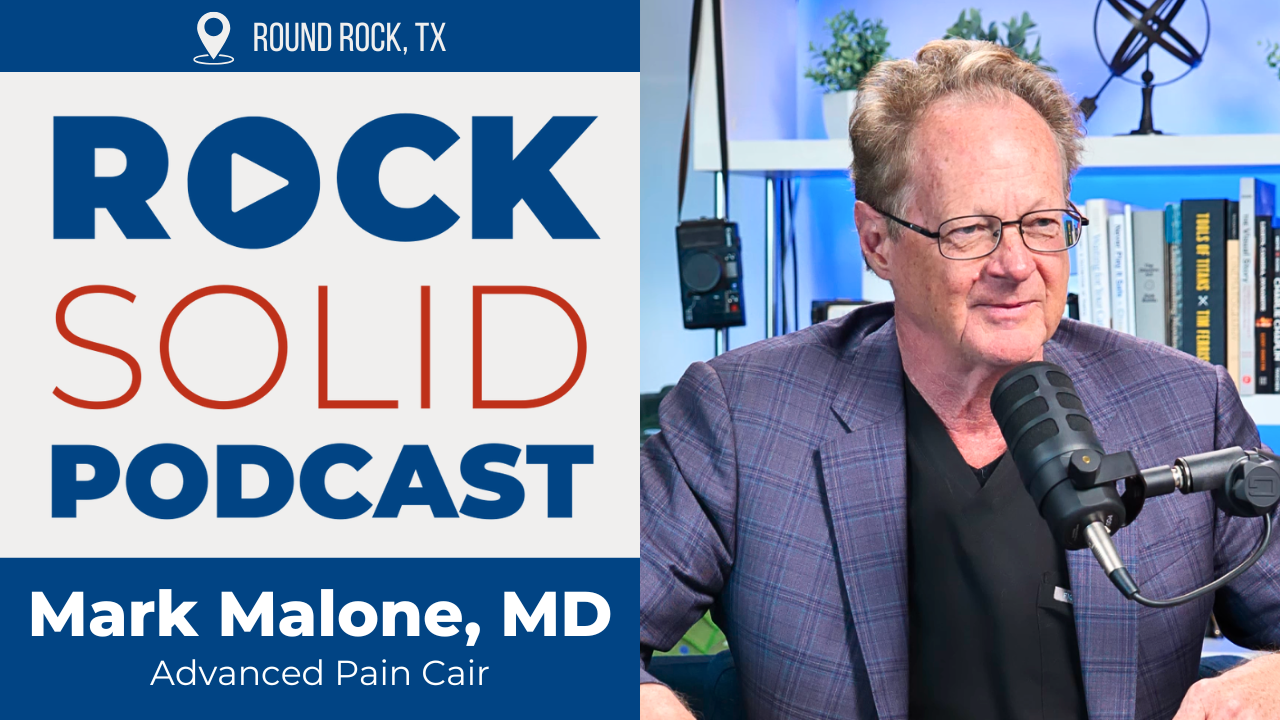Most doctors learn about pain from textbooks. Dr. Mark Malone learned from the floor of his home, stuck there after a devastating back injury. He couldn’t walk. Couldn’t work. Could barely reach the refrigerator. And this was after years of already running a pain clinic.
That kind of firsthand experience? It changes you.
When I sat down with Dr. Malone on the Rock Solid podcast, we weren’t just talking about business. We were talking about what happens when purpose meets pain and how it can scale.
Twenty-three years ago, Advanced Pain Care opened in Round Rock. Today, it’s the second largest pain clinic in the country. That’s not an accident. That’s intention plus empathy, built one patient at a time.
This isn’t a strip mall clinic with a waiting room full of magazines and little else. This is a full scale, multidisciplinary medical facility: 25 doctors, covering everything from pain management to neurosurgery, rheumatology to psychology, all under one roof. And yes, they do surgery. They do it all because chronic pain doesn’t live in one place. It lives everywhere.
Chronic pain affects over 100 million Americans. That’s more than cancer, diabetes, and heart disease combined. Yet most general practitioners avoid it. They’re not equipped to handle it. Some even see pain patients as difficult. But Dr. Malone sees them differently.
“They’re not high maintenance,” he told me. “They’re desperate. They’re at the end of their rope.”
That’s why Advanced Pain Care exists. Because someone has to be the one to help when everything else fails.
Dr. Malone’s own story proves that. In 2008, lifting something too heavy wrecked his back and turned him into a full time patient. He tried it all: opioids, physical therapy, chiropractic care. Nothing worked. Until 2017.
That year, spinal stimulators changed everything. Think of them like a pacemaker for your spine. They block pain signals at the nerve level. After surgery, it was like flipping a switch. One moment, agony. The next, peace.
He calls it the biggest innovation in pain management he’s seen. And he’s not wrong.
But what makes Advanced Pain Care stand out isn’t just the tech. It’s the philosophy. Dr. Malone believes in treating the whole person, body and mind. Pain rarely travels alone. It brings depression, anxiety, financial stress, and lost relationships with it. His team tackles all of it, from physical therapy to behavioral health.
Patients aren’t just names on a chart. They’re people with stories. Teenagers with car wreck injuries. Veterans living with nerve damage. Parents who can’t pick up their kids. Most are over 50, because that’s when the body starts to break down. Gray hair comes, then spinal degeneration.
If they call Advanced Pain Care, they’re seen quickly, often the same day. No waiting weeks. No bouncing between clinics. A comprehensive plan starts right away, often including spinal injections, medications, or even surgery. But more importantly, there’s a team there to walk the journey with them.
When I asked Dr. Malone why Round Rock, his answer was simple: community.
“I love it here,” he said. “The people, the infrastructure, the openness. When we need a permit, we get it. When we need support, we show up and so does the city.”
That support goes both ways. His team gives back through local partnerships, charity events, veterans’ support, Little League sponsorships, and church outreach. It’s not just about medicine. It’s about presence.
And in the next 20 years? Dr. Malone hopes the investment in pain research finally catches up to the scale of the problem. We’re behind. But with spinal stimulation, with continued innovation, and with more training for future doctors, he’s hopeful.
So if you’re in pain or know someone who is and you feel like no one gets it, just remember this: Dr. Malone does.
Because he lived it.
Want to learn more?
You don’t need to remember a fancy URL. Just type “Advanced Pain Care” into Google.

